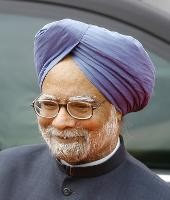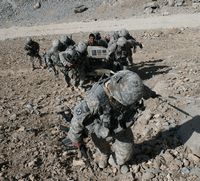Kai Eide, UN Special Representative to Afghanistan, is making it clear that he expects the second round of elections in Afghanistan, which are fast approaching, to be riddled with similar problems as the first. He suggests the silver lining is that this time around, less fraud can be expected. In an interview with Al-Jazeera’s Imran Garda, Eide deflects questions of culpability for the firing of one of Aide’s subordinates, Peter Galbraith, who denounced corruption right after the first round election took place.
Afghanistan Archive
Free Newsletter
President of Afghanistan, Hamid Karzai, accepted an internationally called for runoff election while speaking alongside Senator John Kerry (D-Mass.) in Kabul. In the first round vote two months ago, one-third of Karzai’s votes were discarded after being deemed fraudulent by the Independent Election Commission. It is unclear what, if any, involvement Karzai had in the initial election violations, but it is apparent that he is now prepared to go ahead with a second round of voting. “We consider the decision made by the Independent Election Commission as legal and right,” he says. The runoff election, which will pit Karzai against […]

NEW DELHI — India has long seen a reconstruction role for itself in Afghanistan, despite its lack of direct military involvement in the country. Its interests there are obvious: A strong Kabul that keeps the Taliban — and by extension al-Qaida — in check also ensures that jihadi forces in Pakistan do not use Afghanistan as a backyard assembly line for militants who can then be turned against India, and the rest of the world. But New Delhi is not finding its Afghan sojourn easy. Earlier this month, the Indian embassy in Kabul was attacked for the second time in […]
New York Times Columnist Roger Cohen says Israel needs to tone down their rhetoric in dealing with Iran. The seasoned journalist talks to Charlie Rose and says that it would be unlikely for Israel to take military action against Iran while President Obama is in office. He also discusses the contested definition of a war crime with regards to the Palestinian-Israeli conflict.
The U.N. Office on Drugs and Crime released a report detailing the effects of a $15 billion industry – the Afghan opium trade. The report connects instability in Central Asia and global heroin addiction to the Taliban-taxed drug. The UNODC explains that insurgent groups derive anywhere from $90-160 million in revenue from opium taxes and that the trade could be financing insurgents across borders. Paradoxically, as the drug is globally smuggled, leaving a trail of addiction in places such as India and China, wealthier nations are intercepting less of the drug at their borders.

LOGAR PROVINCE, Afghanistan — The observation post near Route Georgia — the U.S. military’s codename for one of the roads running through this eastern province — had a power problem. In the rugged, breadbasket district of Baraki Barak, 50 miles south of Kabul, there are just a few hundred* American soldiers and a similar number of Afghan security forces to provide security for tens of thousands of farmers and their families. To keep watch over the district between foot and vehicle patrols, the U.S. Army’s 3rd Squadron, 71st Cavalry built observation posts atop mountain “spurs” — ridges, essentially — and […]
The Asia Society’s Jamie Metzl, a Kabul-based election monitor in the first round of Afghan elections, says a power sharing agreement may be the only way for current President of Afghanistan Hamid Karzai to regain any sort of legitimacy to his regime. He explains the expansive ‘systemic’ nature of voter fraud and how that implicates the Karzai government. World Focus’ Daljit Dhaliwal speaks with Metzl.
Bruce Riedel, Author of The Search For Al Qaeda,speaks with NewsHour’s Margaret Warner at the Brookings Institution.The Brookings Senior Fellow chaired the inter agency review that led tothe first Obama Afghanistan strategy. In light of voter fraud, Riedelencourages a runoff. “On the whole, it is a good thing,” he said. But the Afghanistan-Pakistan expert cautions that a runoff will only be effective if it can restore legitimacy to the process.
A couple news items today warrant following up on this previous post regarding the EU and its ability to project power. But this time, I’d like to focus on hard power. Of course, when it comes to hard power, the major constraint on the EU’s ability to project force is the unwillingness of its member states to spend the necessary amounts on defense. But another has been the unwillingness of some member states, primarily Great Britain and until recently Poland, to duplicate structures and force commitments already dedicated to NATO. As a result, EU defense is dependent on ad hoc […]
A lot of the debate over the way forward in Afghanistan revolves around how central safe havens are to the ability of transnational terrorist networks to target the U.S. and the West. Simply put, if you believe, as the Obama administration has stated it does, that the principal mission in Afghanistan is to eliminate the threat posed by al-Qaida, the question becomes, To what extent does that mission depend on denying the group the use of territory? Only after you’ve established your position on safe havens does the question arise of whether creating a stable Afghan state is the best […]
Greg Scoblete wonders whether the Taliban’s new YouTube channel represents an attempt by the group to widen its appeal, and calls the question “disturbing.” I’d actually find it reassuring, if that’s the intention. Radical groups remain radical precisely because they value ideological “purity” over wide appeal. It’s when they attempt to widen their appeal that they are forced to confront the reality of how limited a constituency there is for their radical agendas. And actually being answerable to a wider constituency only reinforces that process. The reason Hezbollah has been deterred by the 2006 Lebanon War is not because of […]
NewsHour’s Margaret Warner interviews former Afghan presidential candidate, Ashraf Ghani. Ghani explains the fears of the average Afghan that without a clear government in place, widespread fractionalized violence will return throughout the country. He says of his fellow countrymen, “They’d rather have a bad government then no government at all.”
Interviewed on C-SPAN’s Washington Journal, U.S. Sen. Jim Webb defendsPresident Obama’s deliberate approach to determining the direction ofU.S. strategy in Afghanistan. Webb says the war in Afghanistan cannotbe appropriately analogized to Iraq. Even if it could, Webb believesthat the lessons of Iraq don’t necessarily make the case for a surge oftroops in Afghanistan for a full-blown counterinsurgency. Clip 1 Clip 2
BAGRAM, Afghanistan — Nearly a week after Taliban fighters overran a U.S. and Afghan military outpost in eastern Afghanistan, killing eight Americans and at least two Afghan soldiers, details are finally emerging about the bloody battle. But one U.S. Air Force official wonders why the air service hasn’t highlighted its own vital contributions to it. The battle in the Kamdesh district of Nuristan province pitted hundreds of Taliban fighters against several platoons of American and Afghan troops in an isolated outpost. A platoon typically numbers 40 people. In hours of heavy fighting, the Taliban managed to penetrate the outpost’s walls […]
The debate over the Afghanistan War is now swirling around in a few different directions, with the primary focus in recent weeks being on short-term options and the Obama administration’s process for policy development and implementation. That’s understandable, given, on the one hand, the urgency of the situation on the ground — as reported by Gen. Stanley McChrystal in his strategic review, and independently by the analysts who advised him in the preparation of that document — and on the other, the Obama administration’s “sticker shock” when presented with the resources needed to wage its stated strategy of a counterinsurgency […]
As reported by Rajiv Chandrasekaran, the Afghanistan War strategic review officially spirals into “crash and burn” mode. For all of its mindboggling revelations, one graf from the article leaped out at me: Less than three weeks after Obama took office, the White House selectedformer CIA officer Bruce Riedel to review U.S. policy towardAfghanistan and Pakistan. Riedel was told to consult broadly but actquickly: The president wanted his conclusions by mid-March, before aNATO summit in Europe early in April. (Emphasis added.) Of course, that was the combination “first date/honeymoon” summit where President Barack Obama expected to use his post-election political capital […]
